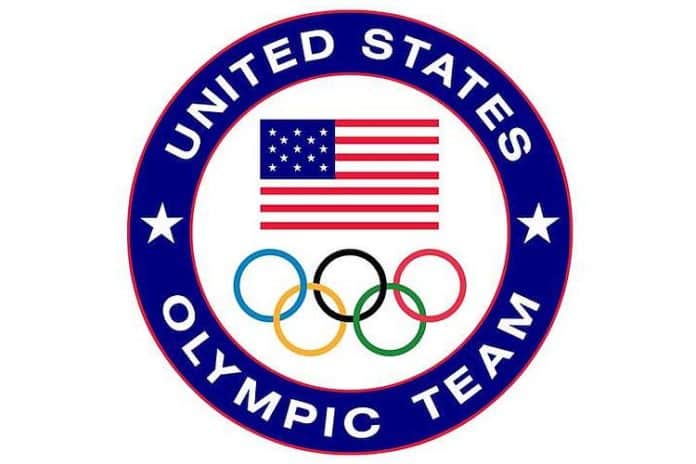★ The Sports Examiner: Chronicling the key competitive, economic and political forces shaping elite sport and the Olympic Movement.★
★ To get the daily Sports Examiner Recap by e-mail: sign up here! ★
★ Last week! Thank you to our =51= donors who have helped meet our technical costs. If you’re enjoying TSX, please chip in with your donation.. Add your support to make this site even better. ★
≡ THE U.S. OLYMPIC MOVEMENT ≡
If you hate the U.S. Olympic & Paralympic Committee, or foam at the mouth when one or more of the U.S. National Governing Bodies is mentioned, please skip this column. You won’t like it.
But there is a recent trend in the performance of U.S. summer Olympic sports which continued at the just-concluded Paris Olympic Games that’s worth noting.
American teams in swimming track & field won less than half of the U.S.’s total of 126 medals.
That’s the second Games in a row the two leading U.S. federations did not win half or more of the total American medal haul, but only the second time this century. But what was more impressive was the spread of the medals won by Team USA athletes to a record 29 National Governing bodies:
● 34: Athletics
● 28: Swimming
● 9: Gymnastics
● 7: Wrestling
● 6: Cycling
● 5: Shooting
● 4: Fencing
● 3: Basketball, Skateboarding
● 2: Archery, Canoeing, Rowing, Sport Climbing, Tennis, Volleyball, Weightlifting
● 1: Artistic Swimming, Boxing, Breaking, Diving, Equestrian, Football, Golf, Rugby Sevens, Sailing, Surfing, Taekwondo, Triathlon, Water Polo
That’s by far the largest number of National Governing Bodies to win medals in a single Games for the U.S., four more than the prior high at Tokyo 2020 (25). And it is the sixth time in seven Games this century that 20 or more U.S. NGBs produced medal winners.
It used to be that swimming and track produced most of the medals. At Mexico City 1968, swimming and track won 80 out of 107 U.S. medals. At Munich 1972, 55 of 94, and at Montreal 1976, 56 out of 94.
After the Moscow 1980 boycott, however, things changed. For one, the Amateur Sports Act of 1978 was passed, making the then-United States Olympic Committee the central coordinating body for Olympic sports in the U.S.
The Act also created single-sport National Governing Bodies – the Amateur Athletic Union governed eight sports for Montreal 1976 – and resolved the decades-long NCAA-AAU fight over athlete eligibility.
The results were made clear at the 1984 Olympic Games in Los Angeles, which with the Soviet-led boycott, produced a medal bonanza for the U.S. of 174 medals, the most since 1904 in St. Louis. In 1984, athletes from 22 NGBs won medals; swimming & track combined for 74 and the other 20 sports won 100 medals, or 26 more. That kind of production has not been seen since.
With the return of the USSR for 1988 and 1992 (as the “Unified Team”), U.S. medal production was less, of course (“SW-TF” is swimming and track & field):
● 1988: 94 by 19 NGBs (44 SW-TF vs. 50 by all others): +6 for all other NGBs
● 1992: 108 by 17 NGBs (57 SW-TF vs. 51): –6
The 1996 Atlanta Games was the first with the Soviet Union broken into multiple countries, with many more entries and more medal opportunities. Thus, despite having a home Games, medal production went DOWN for the U.S.:
● 1996: 101 by 21 NGBs (49 SW-TF vs. 52): +3 for all other NGBs
In the 21st Century, starting at Sydney 2000, swimming and track & field have usually led the way:
● 2000: 93 by 22 NGBs (49 SW-TF vs. 44): –5
● 2004: 101 by 22 NGBs (53 SW-TF vs. 48): –5
● 2008: 112 by 20 NGBs (56 SW-TF vs. 56): Even
● 2012: 104 by 18 NGBs (59 SW-TF vs. 45): –14
● 2016: 121 by 22 NGBs (65 SW-TF vs. 56): –9
The Tokyo 2020 Games, held in 2021, were deeply influenced by the Covid pandemic, but saw the “other” NGBs win more medals than swimming and track for the first time since Atlanta, with a record for the most NGBs to win a medal:
● 2020: 113 by 25 NGBs (56 SW-TF vs. 57): +1 for all other NGBs
In Paris, the number of NGBs expanded against to a record 29 in a Games which saw the most medals won by a U.S. team since Los Angeles:
● 2024: 126 by 29 NGBs (62 SW-TF vs. 64): +2 for all other NGBs
This is impressive for multiple reasons. Yes, there are more sports and events in the Games now, but the U.S. didn’t pick them. However, the USOPC either self-managed or found NGBs to handle all of the new sports and events and to get quality teams chosen.
The world is getting better in every sport, and this was certainly true in swimming, where American medal production was still by far the highest at 28, but with the lowest total since Athens 2004.
And the U.S. has transitioned, finding new sports to star in. While swimming and track & field have been stalwarts for the U.S. Olympic efforts since the beginning of the modern Games in 1896, Americans used to regularly produce medals in boxing, sailing and diving, to name three sports which won one medal each in Paris.
But in 2024, U.S. athletes from 29 National Governing Bodies won medals, well ahead of the other top medal-winning countries:
● 91 medals: China, in 21 sports/disciplines
● 65 medals: Great Britain, in 18
● 64 medals: France, in 22
● 53 medals: Australia, in 15
The USOPC has oversight of all the National Governing Bodies and relative to the Olympic Games, signs an agreement with each NGB at the start of the Olympic cycle, setting a goal for achievements or medals for the next Olympic Games. This “high-performance” agreement is the basis for funding of that NGB for the rest of the Olympic run-up period and is one of the ways – but far from the only way – that NGBs are evaluated on a rolling basis.
For Paris, a lot of NGBs met their targets and beyond, including USA Swimming, which “slumped” to 28 medals; Australia was next with 19.
Was this a “perfect” Games for the U.S.? No; for example, Americans won 48 golds in London and 46 in Rio, but 39 in Tokyo and 40 in Paris. But Paris was, overall, an outstanding effort, and the most U.S. medals ever in an Olympic Games held in Europe, typically a challenging location for American teams.
So, congrats to the USOPC and the Sports Performance Division led by Rocky Harris, the Chief of Sport & Athlete Services. The bad news? Much more pressure ahead for the first home Olympic Games in 32 years, in Los Angeles in 2028.
Rich Perelman
Editor
★ Receive our exclusive, weekday TSX Recap by e-mail by clicking here.
★ Sign up a friend to receive the TSX Recap by clicking here.
★ Please consider a donation here to keep this site going.
For our updated, 547-event International Sports Calendar for the rest of 2024 and beyond, by date and by sport, click here!


























